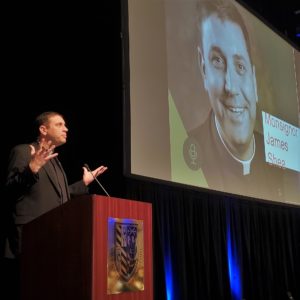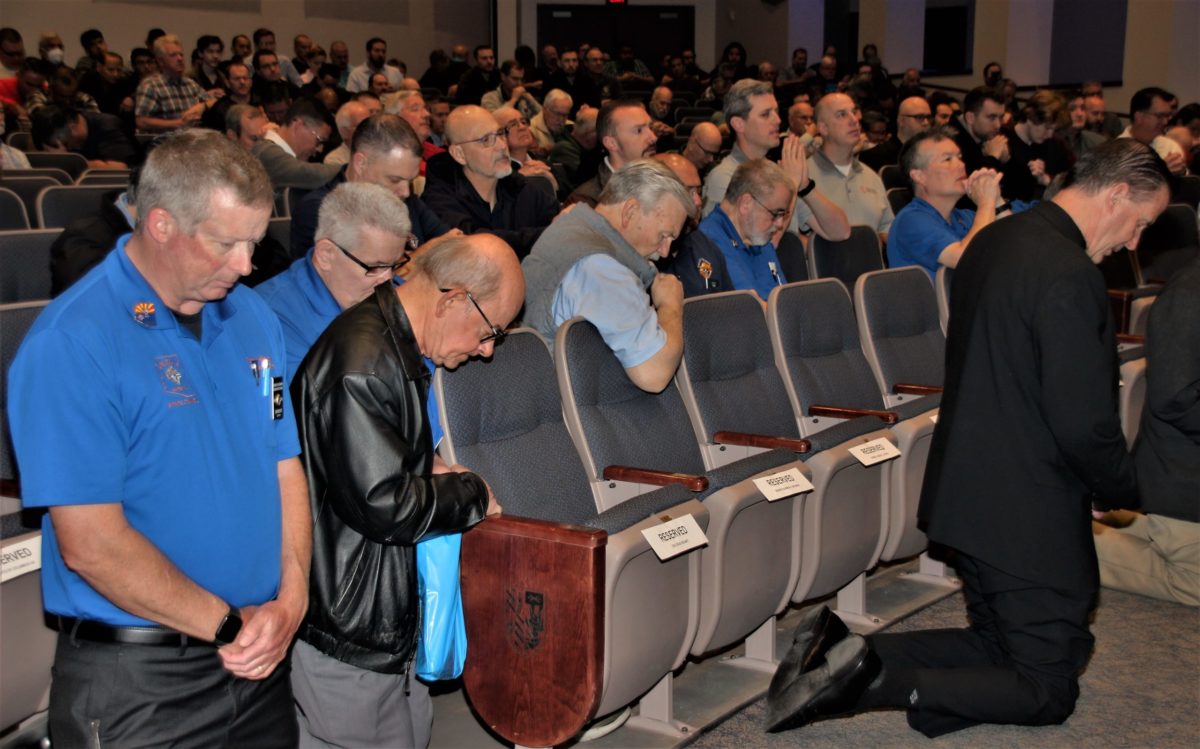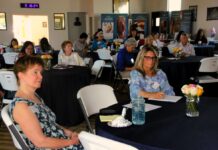By Jeff Grant, THE CATHOLIC SUN
PHOENIX — Catholic men from across Arizona came together for a day of inspirational messages and fellowship designed to strengthen them for living faithfully for God in the face of the world’s anti-Christian culture during the Diocese of Phoenix’s 15th Annual Catholic Men’s Conference.
An estimated 400 men, ranging in age from their late teens to their late 70s and perhaps even early 80s, gathered at Xavier College Preparatory in central Phoenix, where a series of speakers addressed what it means to live as “Eucharistic and Apostolic Men.”
Bishop Joseph L. Coffey, one of four auxiliary bishops of the Archdiocese for the Military Services of the United States discussed what a Catholic man does with fear.
Using a verse from the Book of Ezekiel in which the prophet says God is looking for a man to stand “in the gap” for God (Ez 22:30) and Bishop Thomas J. Olmsted’s Apostolic Exhortation, “Into the Breach,” in which Bishop Olmsted states that the battle for the faith is “wounding our children and families” and “distorting the dignity of both men and women,” Bishop Coffey said that standing back in fear and hesitation is not an option today.
“My brothers in Christ, Bishop Olmsted wrote that Apostolic letter to the Diocese of Phoenix back in 2015, and none of us knew how fractured things were going to get. This pandemic was the stuff of science-fiction books and movies, and now it’s real. These last two years have been all too real. The need for us to be men; Catholic men of virtue and courage especially is real.”
He used, as examples of courage, the stories of military priests, Fr. Vincent Capodanno and Fr. Emil Kapaun.
Fr. Capodanno died during the Vietnam War in an ambush by North Vietnamese soldiers on Sept. Sept 4, 1967, while serving with the 3rd Battalion, 5th Marines. During the ambush, a wounded Fr. Capodanno ran to aid a wounded Navy corpsman pinned down by enemy fire, providing medical and spiritual attention. ]
Though unarmed, Fr. Capodanno was shot 27 times and died on the battlefield. He was posthumously awarded the Medal of Honor, the nation’s highest medal for valor in combat awarded members of the armed forces. He also received the Navy Bronze Star medal, the Vietnamese Cross of Gallantry with Silver Star and the Purple Heart.
Fr. Kapaun was serving in the Korean War with the 8th Cavalry Regiment, 1st Cavalry Division on Nov. 1, 1950, when it was attacked by the Chinese. He ministered to 30 wounded American soldiers and refused to leave them and was among those American prisoners being forcibly marched to a POW camp in North Korea. Soldiers too hurt to march were shot, noted Bishop Coffey.
It was during that march that Fr. Kapaun calmly stepped between a Chinese soldier about to shoot a wounded American prisoner and pushed the enemy rifle aside, helping the American to his feet and then assisting others in carrying the American to the prison camp, where atrocious conditions and illness later claimed Fr. Kapaun’s life. He, too, was posthumously awarded the Medal of Honor at a ceremony attended by the American prisoner whose life he saved.
“As followers of Christ, we are all called to be holy and courageous. (Josh 1:9),” Bishop Coffey told the conference., urging them to attend Mass, receive Communion and Confession and pray the rosary and consistently seek the intercession of the Blessed Mother and the saints.
“We have so many weapons at our disposal. We have to fight for our faith,” he said.
That fight is happening in a new apostolic age, said one speaker.
In perhaps the day’s most dramatic characterization, University of Mary President Msgr. James P. Shea said that the landscape upon which Christians fight to live in obedience to God is 180 degrees apart from that which existed even 15 years ago.
Moreover, the shift should surprise no one, the monsignor said.

He pointed to a 2007 document summing up the position of bishops across Latin America on the world’s cultural, social, and spiritual landscape upon which the Church was operating. Known as the Aparecida Document, that lengthy statement issued by Pope Benedict XVI was primarily authored by Archbishop Jorge Bergoglio of Buenos Aires, who later became Pope Francis.
“That document stated, in part, ‘We are living through a change of epoch, the deepest level of which is cultural. The all-embracing conception of the human being, in relationship with the world and with God is vanishing.’” Msgr. Shea told the men’s conference, quoting from the “Letter of His Holiness Pope Benedict XVI to the Bishops of Latin America and the Caribbean, (Sec. 2.1.1; No. 44)
An Apostolic Age is not new, either.
The 12 Apostles operated in such a time, followed by those they discipled. In fact, the Church continued to work in that atmosphere for the first 300 or so years after Jesus’ death and Resurrection.
However, this apostolic age is different, given that the world had been evangelized and operated with the Gospel as a cultural component. Today, through a steady process, Msgr. Shea said the world “has rid itself of its Christian basis.”
Therefore, he asserted, Catholic men and others must adapt.
And they must not look back.
“There is no room for nostalgia for disciples of Jesus. Don’t wish you lived in another age, ever. God places every human being into the world, into the time that He wants them to live. And that’s the canvas on which the great drama of their life will be painted.”
Then, in a comment that ended with scattered whoops and applause, Msgr. Shea urged the men onward.
But this is a time not for discouragement but for great hope. God gives grace in every single age. And, this new Apostolic Age is such, that if we live it well, when we die, they’ll rush up to us at the Gates of Heaven to hear our story. The heroism we are called to in this time, the clarity of mind, the purity of heart that’s offered to men who are called to be serious Catholics in an age like this is great.
“You cannot go through life as a Catholic as a tourist in the age in which we live. We’re soldiers now. It’s a new time. It’s a new era. It’s a time to really gird our loins and go forward.”
Other speakers directed men to specific ministries.
Doug Connolly, a professional in the financial services industry and parishioner at Mater Misericordiae, who started a group whose mission is involving other men in the pro-life movement, said he believes the opportunity is great to reduce abortions in places such as the greater Phoenix area, and he urged others to join.
“If more men were to spend time – 9 or 10 hours a year praying in front of (an abortion) clinic, we could bring the abortion industry to its knees, especially here in Phoenix, where it’s teetering as it is.”
“If I’m a Catholic man looking for friends or to make an impact, this is where I’d look. Go where the action is. You won’t lonely long in this life, and your work will be even greater in the next.”
Kevin Starrs, who heads the Diocese of Phoenix’s Prison Ministry, shared the approach that drew him closer to God following a childhood that included a difficult relationship with his father and, later, a marijuana addiction that the Lord freed him from.
“I started going to Mass and crying out to Him. I went on retreats. I started to fast. And, little by little, He started to take the ‘weed’ away. It was a slow process. I read. I started to meditate on the Scriptures.”
He eventually became interested in mentoring and counseling young men, including those with gang ties, and in 1994 was hired by the Diocese to go into prisons and speak with inmates.
Starrs shared with the men his advice for a deeper and more productive life with God.
Start meeting with Him. “Go to your ‘closet’ where no one but your Heavenly Father sees you. It’s about spending consistently, quality time alone with God.”
He challenged the men to step back and ask, “What does my prayer life look like? Do I get up in the morning to be with my Lord, who is crying for me to come?”
“Get into the Mass readings. Before you know it, 30-40 minutes will go by fast. That will prepare you to go out into the world for the day with courage.”
For those with the wounds of bad experiences with parent, Starrs said they must not fear facing those hurts, and recognize that some wounds take a lifetime to heal, but that with God all things are possible.
“A lot of us men have been carrying father wounds or a parent wound. At the end of the day, we kind of just accept it – that’s just the way it goes. But the truth is, those wounds cut deep into who we are and they affect our relationships. I’m 63 years old. God’s still healing me. You’re never too old to ask Him to help you heal, help you forgive your father or your mother.”
“Jesus, besides being our Savior, besides being all the things He is to us, He is our healer. He wants to help you.”
Josh Brittain, who works in real estate, coaches high school football and is a motivational speaker, discussed living with cerebral palsy, a group of disorders that affect a person’s ability to control his or her muscles, hindering movements, balance and posture. Like many sufferers, Brittain was born with the condition. At 31 and a happily married father of three, Brittain said the illness spurred him toward a love for God.
He learned to live with the principle that he was made by God “not for comfort, but for greatness.”
And, he urged them to look to Jesus as their example.
“The greatest man to ever walk this earth endured the greatest adversity, shame and suffering. And, He made the greatest sacrifice.”
“When our adversity comes, and it inevitably will, we should not only look to God during these times, but we should thank Him. Whatever our calling is in this life, it is our God-given path to greatness.”
For Matt Birk, that call was professional football.
The Minnesota native played 15 years in the NFL, including 11 with his home-state Vikings and four with the Baltimore Ravens, being named to six Pro Bowls and two All Pro teams. A center, Birk was a member of the Ravens’ 2013 Super Bowl winners and was named in 2011 the league’s Walter Payton Man of the Year, an award recognizing play on the field as well as philanthropy and community impact off it.
Two years later, he was a member of the Ravens’ 2013 Super Bowl winners. He also drew headlines for skipping the team’s White House visit over President Barak Obama’s closing remarks in a speech at Planned Parenthood, in which the president was quoted as saying, “Thank you, Planned Parenthood. God bless you.’”
Birk used his position on the field as the theme for his remarks. “Staying Centered” in life means starting with and remaining grounded in the fundamentals.
On the gridiron, Birk said he needed to learn to become a football player. His coaches told him that was centered primarily on doing five drills as part of each practice.
“We would do these things every single day. They weren’t glamorous. For example, you never hear someone watching a TV game say, ‘Did you see how the center snapped the ball? It was perfect.’ It never makes the Top Ten Plays. You never notice the snap unless the ball goes over (the) player’s head. You always blame the center.”
“On Sundays there’s either success or failure. If you win, people high five you, if you lose everyone has a suggestion.”
With the pressure, comes “a lot of money and notoriety,” Birk said he had a simple solution to avoid getting caught up in those things:
“…focus on the fundamentals of my job, every single day. I didn’t go out there, just thinking I was going to ‘make it happen.’ Focusing on those fundamentals every single day is what enabled me to stay focused and stay in the NFL for so long.”
On the day of the Super Bowl, during warmups, Birk felt unusually relaxed.
“I wasn’t nervous. In my mind, I wasn’t playing in a game 100-million people were going to be watching. It was real simple. I was just going to go out there, snap the football. Just do my fundamentals – the same thing I had been doing my entire professional life.
So it is with being successful in our faith.”
“Before we do the will of God, we have to live in the will of God — I call them the Catholic fundamentals: Mass, Confession, rosary, the saints – the Hall of Fame of Catholics – We have all of this at our disposal.”
“This applies to discipling other men as well. Discipleship is about being before doing. You can’t give away what you don’t have.”
And, he said it all starts with prayer.
“I pray every day to find my identity in Jesus Christ. It doesn’t take any talent. (Nor does it) take any talent to go to Mass, or go to Confession, say the rosary or go to adoration. All it takes is effort. All it takes is commitment.”
Conference participants came away with their faith energized, commitment strengthened, and their love for God and the Church rekindled.
Kris Machain, 40, who attends St. Mary Church in Chandler and is a married father of two daughters, ages 5 and 10, was moved by Msgr. Shea’s characterization of the world dynamic for the Church. Though the family attends Mass weekly and he prays daily in the morning, Machain said he can always do better.
“I need to be a soldier for myself, my family and my two daughters,” he said.
Dcn. Lance Vivet of St. Catherine Laboure Church in Chino Valley, about 15 miles northeast of downtown Prescott, leads weekly Scripture classes at the church, said the gathering was a powerful way to encourage and challenge men to discuss and share their Catholic faith.
“It’s difficult, if you believe in Christ, to become comfortable in this world,” said Vivet, father of four adult children ages 27-43. “Men need accountability and encouragement to remain grounded in their faith, so they can share it and live it before their children. A lot of the youth, if you ask why they’re no longer Catholic or going to church, they will tell you they find the Church or their parents hypocritical, saying, ‘What I hear at church, I don’t see at home.’”
Derek McMonagle, 25, said the conference gave him “a lot to take and use.”
A Pittsburgh native who grew up attending Catholic schools in that area, McMonagle said he gradually drifted away from the Church while attending a non-Catholic Christian university there before moving to the greater Phoenix area, where his professional life helped crowd church out even further. Since attending Queen of Peace Church, McMonagle said he’s rediscovered his commitment and love for Catholicism, and being at the conference was the latest step.
“Being here, surrounded by these men of all walks of life and different ages, being able to profess their faith; it’s been very empowering. I have a lot of growth to go, and it’s been super-inspiring. It’s been an amazing experience.”







